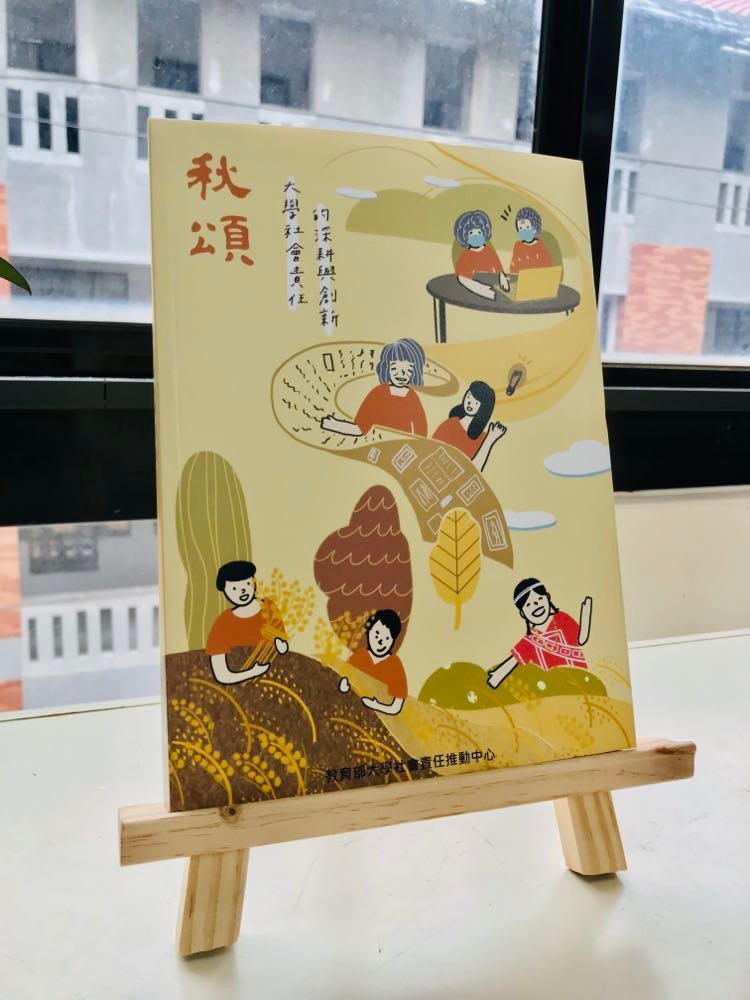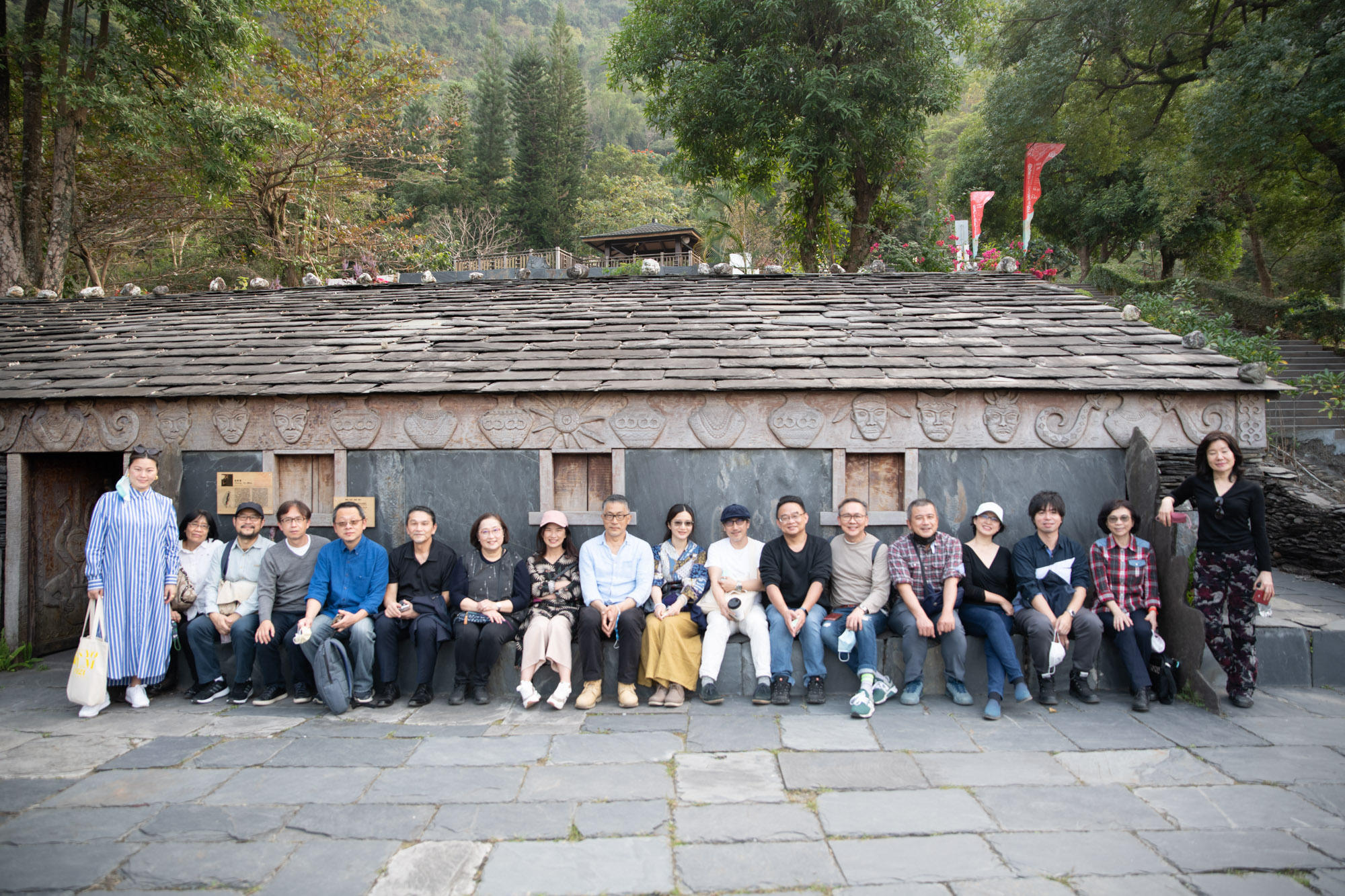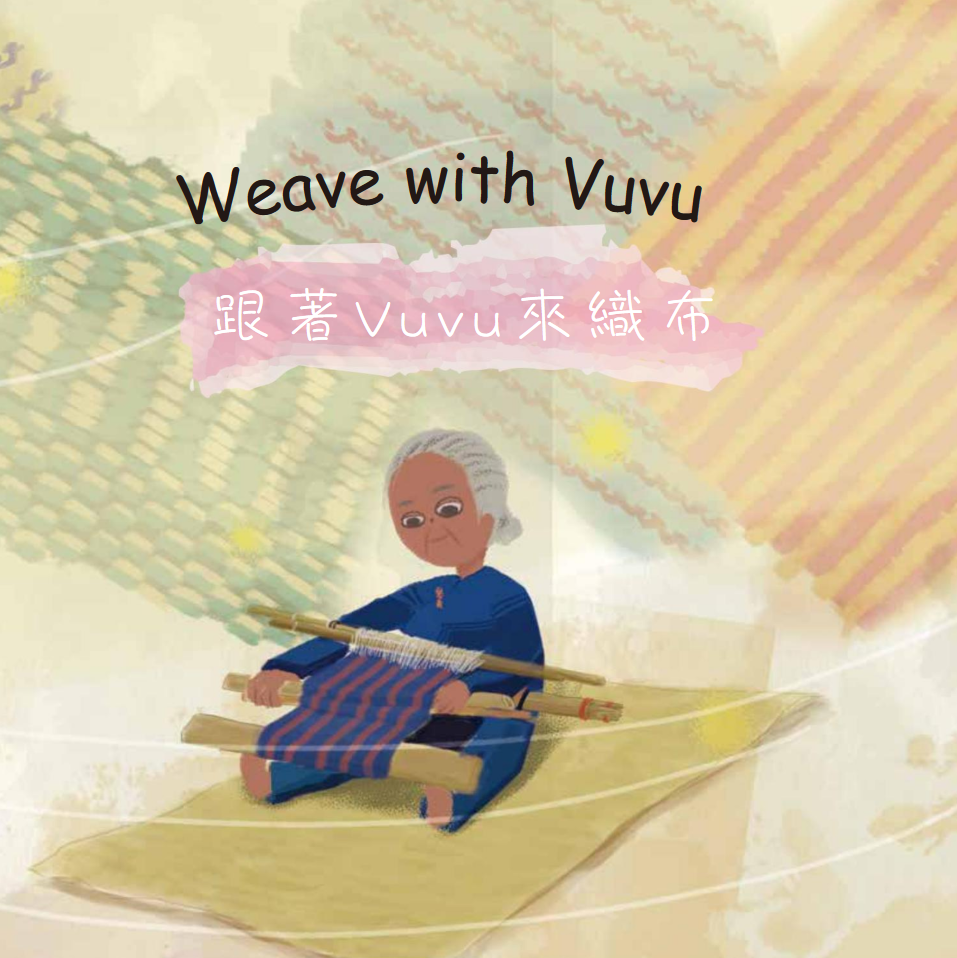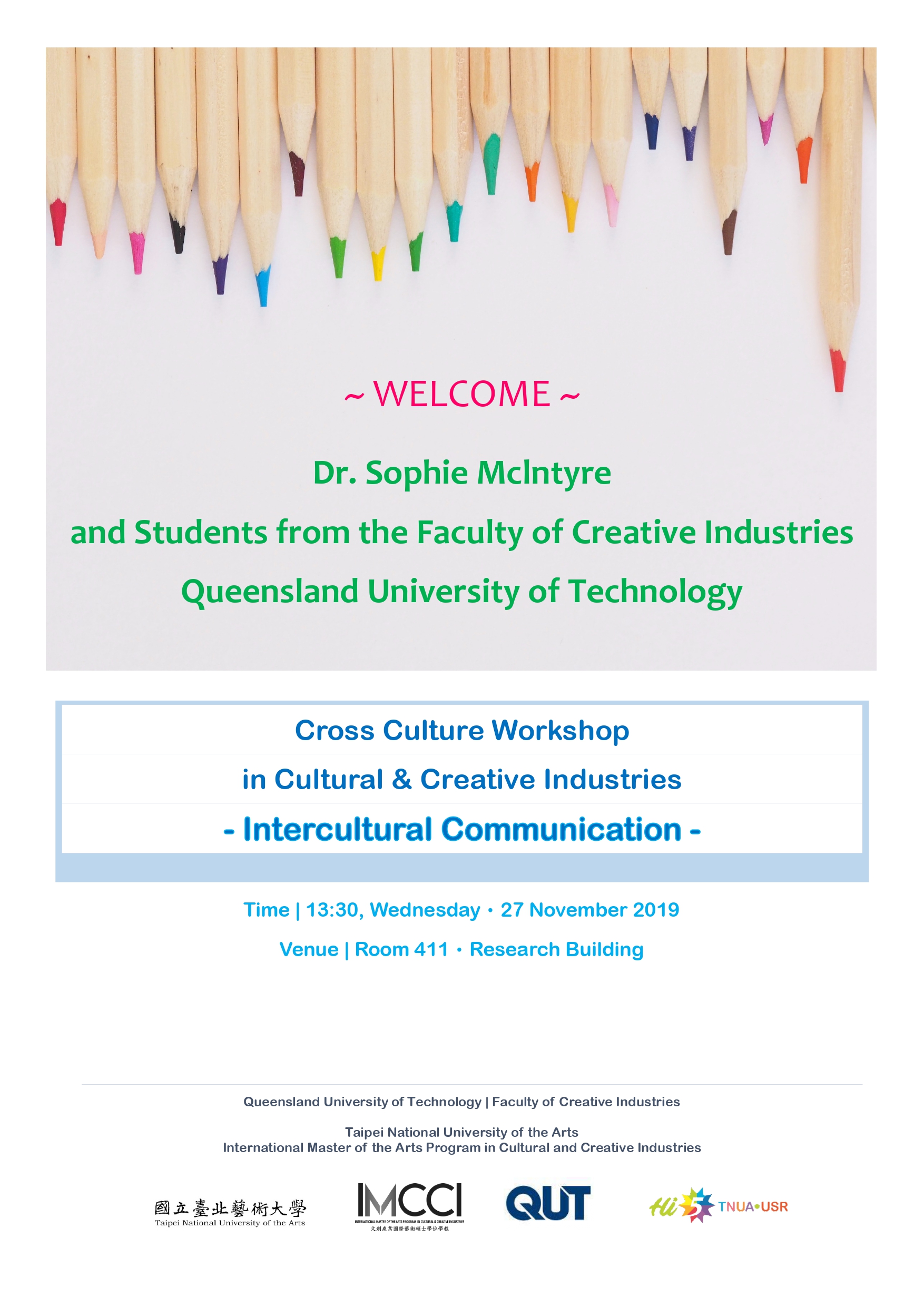
學術性文化意識分享
2019 USR計畫活動 – 文創產業跨文化工作坊:跨文化交流
昆士蘭科技大學的大學生蒞臨北藝大IMCCI學程,進行一場跨文化交流工作坊。這群大學生來自昆科大的創意產業學部,到台灣進行兩週的創意產業遊學。遊學之旅的第四天,他們來到北藝大,也參觀了台灣各地的創意熱點和產業,包含博物館、藝術村和表演空間。這趟旅程只可意會不可言傳,提供他們文化、創意、學術交流跟建立人脈的機會。工作坊著重在文化意識並由昆科大學生們開啟對話。
IMCCI的碩一生在這場交流中呈現了簡報,強調他們在台灣觀察到和自己國家相似或不同之處,簡報涵蓋文化政策、創意空間、原民性、交通和食物等範圍。IMCCI學生們共同製作出言簡意賅的簡報,提供他們家鄉的文創產業概況,並跟剛到台灣所觀察到的情況做對比。工作坊以導論做開場,學生們再分享他們來自哪裡以及因為什麼原因選擇台灣就讀創意產業。從多樣性的回答可以立刻了解到,我們都有一個共通點:想在台灣學到如何更加接納不同藝術與文化。
昆科大和北藝大的主任分別給予各自學程的介紹和內容。兩個學程的學生都來自不同文化背景、擁有不同興趣,讓雙方參照自己的教育經驗和方法,也拋出如何書寫文化的疑問。這場分享的時刻對IMCCI學生很實用,因為他們在這學期的許多課程中也有相關討論。
IMCCI學生提出好幾個關於文化政策的觀點,例如缺乏執行方法。就發展中國家而言,如果文化政策存在,政府資助或援助其他資源給創意產業的程度會有所限制,多半也會依賴國際和私人投資方。然而在台灣,政府對這產業提供多樣性支援。創意和文化被運用在各個領域,從社區設計到教育,創意無所不在也沒有盡頭。
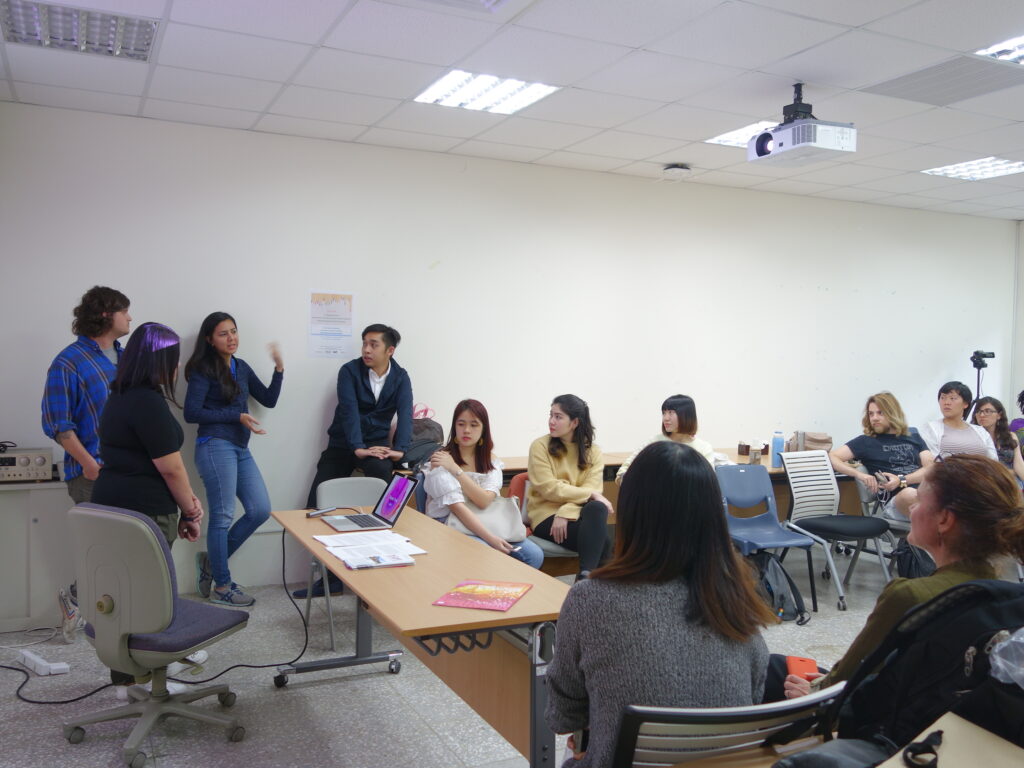
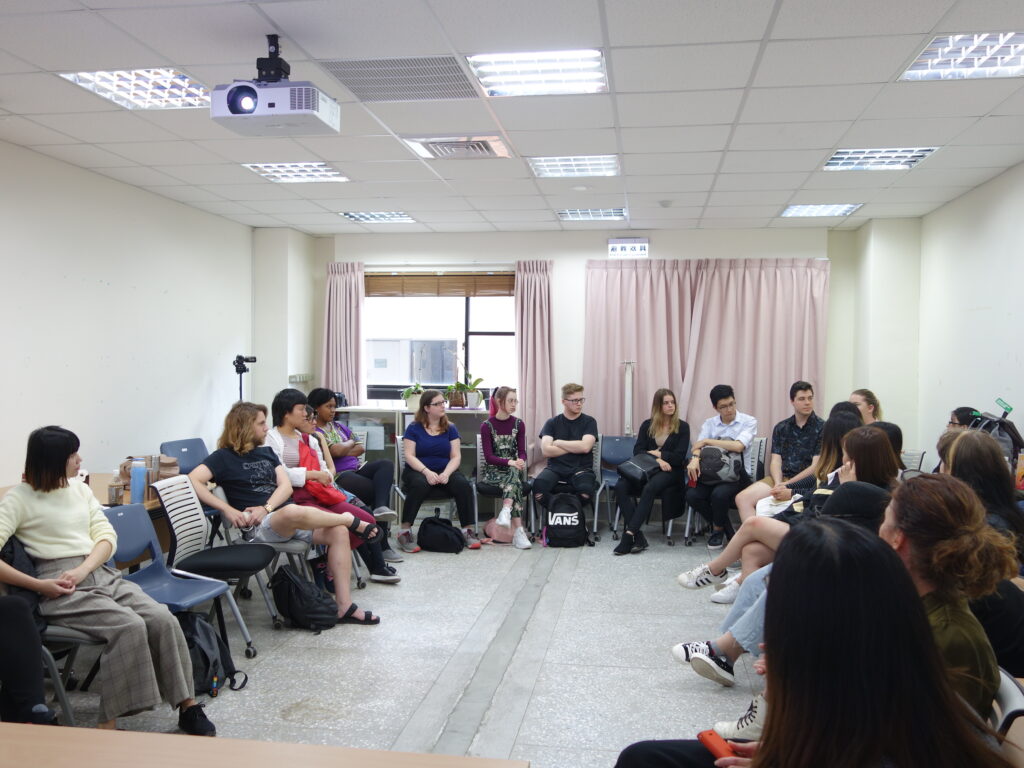
photos by Cecile Kao
昆士蘭學生對IMCCI學生提供的家鄉-台灣對比非常感興趣。作為回應,兩位昆科大的學生針對澳洲原住民的主題給予簡短的介紹。
總的來說,這場工作坊啟發了雙方學生,給了IMCCI學生和創意產業學部的大學生交流全球文化、創意產業觀點的機會。對於前者,這場座談讓學生更認識他們的同儕跟不同區域的創意產業:已開發國家和開發中國家、創意產業中心和領導國家,或剛開始發展創意產業的區域。這場分享提供現今產業的內容和脈絡。雙方都有組織地一窺全球創意產業的狀態。分享內容也與這學習在課程內討論的有關聯,提供東南亞社群的創意產業跟原民歷史一個脈絡。
活動也提供雙方學生討論的空間,讓雙方有更深層的理解。問題圍繞在國際學生如何與台灣創意產業產生交流,或他們如何遊走在差異之處,讓學生們深刻反思自己的經驗,以及這些經驗如何影響他們對自己家鄉創意產業的理解。
台灣跟澳洲的原住民人口比例和歷史關聯性是簡報中值得注意的部分。和台灣一樣,澳洲「原住民」也受到政府某種程度上的認可和致歉。對大部分的IMCCI學生,澳洲原民歷史和創意產業都不是我們熟悉的話題,因此昆科大學生分享的資訊具有極大價值。我們也學到澳洲原民藝術某種意義上具有商業價值,對原民社群有益。
對昆科大學生而言,和來自不同藝術和學術背景的IMCCI學生分享的機會非常難得。根據澳洲學生的回饋,他們認同且欣賞台灣創意產業跟對文化的尊重。或許這場工作坊最有學習意義的是,發展藝術跟欣賞原民文化的渴望是跨越邊界和國家的國際現象。
結合不同領域促進創意產業發展是在這場活動獲得的知識。看到昆科大學生對多領域專業都有興趣,讓IMCCI學生思考範圍更廣的研究主題。此外,這開啟了對比國際創意產業的思考新維度。了解澳洲的創意產業,給予我們另一個全球形勢的觀點。對於昆科大學生,這趟拜訪或許也讓他們了解台灣脈絡下的創意產業,增加國際觀,讓他們知道台灣和IMCCI同學來自的國家現況。整體的經驗具有啟發性跟教育性。大部分IMCCI學生分享說,參與類似的遊學是延伸工作坊之所學最理想的方式。這一定會給予他們在另一個國家所需的實地經驗,給予他們接觸和經歷另一創意產業的機會。
– written by Melody Wagner
English Version
An Intercultural Communication Workshop was held between Undergraduate students from the Queensland University of Technology visiting the Taipei National University of the Arts’ students in the IMCCI Program. The Undergraduate students from the University’s Creative Industries Faculty were in Taiwan for a 2 week Creative Industry Study Tour. Their visit to the TNUA Campus was day 4 of their tour which included visits to diverse creative hotspots and industry spaces including museums, art villages and performance spaces across the country. The visit was immersive to say the least, providing an opportunity for cultural, creative and academic exchange as well as networking. The workshop focused on Cultural Awareness and was spearheaded by the students.
First year students in the IMCCI Program were tasked with creating a presentation highlighting observations they made on differences and similarities between their home countries and Taiwan. The presentation highlighted areas of Cultural Policy, Creative Spaces, Indigeneity, Transportation and Food. IMCCI students collaborated to develop a detailed yet succinct presentation that provided an overview of the cultural and creative situations in their countries and contrasted that with what has been observed during their brief stay in Taiwan. The activity opened with introductions, students shared where they came from and what made them come to Taiwan and study Creative Industries. From the variety in response it could immediately be recognized that we all had the similarity of wanting to learn from Taiwan some ways to be more inclusive of the arts and culture.
The directors of each respective program delivered an introduction and overview of what each program entailed. Both programs had students from various backgrounds and interests, and diverse cultures. Allowing opportunity for both groups to contrast their individual educational experience and approach. As well as ask questions about controversial ideas on how to write about culture. This moment of sharing was useful for IMCCI students who have had related discussions on the idea in the context of several classes this semester.
Major points highlighted by IMCCI students about cultural policy was the manner of implementation and for some the lack of such a guideline ever existing. For developing countries if a cultural policy existed, the level of government support for the industry in terms of funding and other resources is limited and for the most part dependent on international and private investors. Whereas in Taiwan the Government provides a great level of support to the industry and the benefits of creativity and culture is employed in all sectors from community designs to education. Creative programming is unending and accessible to all.
The students from Queensland were pretty intrigued by the information provided by students on both their countries and Taiwan. In response a short presentation highlighting some of Australian Indigenous history was shared by 2 students from QUT.
Overall it was an enlightening experience for both groups, students in the IMCCI program and Creative Industry Undergraduate alike as they both had an opportunity to interact with cultures, ideas, and creative industry perspectives from across the globe. For IMCCI Students the forum provided information on the background of their peers as well as creative industry in diverse spaces. Coming from both developed and developing countries – from spaces that are sometimes seen as culture and creative industry hubs and leaders to areas that are just beginning to develop an industry and even those working through a revival. The sharing provided content and context for those present. Both groups got an organized glimpse of the global status of creative industries. It also connected with what was being discussed in courses during the semester, providing context on another South East Asian community’s creative industry and indigenous history.
The activity also provided a space for discussion between the students to take place. Which allowed an opportunity for deeper understanding and sharing to occur. Questions surrounding how international students in the program interact with the Taiwanese Creative Industry or how they navigate within the space of the difference were asked. Allowing students to reflect on a deeper level on their experience and how that might influence their understanding of the creative industry in their home countries.
Notable from the presentations was the connection shared between Taiwan and Australia in their indigenous population percentage and history. Like in Taiwan, Australian “Aboriginals” have been provided with some degree of recognition and apologized to by the government. For most of the IMCCI students, Austrailian Indigenous history and creative industry was not a topic we were familiar with, therefore the information shared was of great value. We were also told of ways that Australian Aboriginal art is being monetized in a way that benefits the Aboriginals’ community.
The chance to share with students who like IMCCI Cohort are from different artistic and academic backgrounds was enlightening. Based on the feedback of Australian Students, they too agree that Taiwanese Creative Industry and respect for culture is something to admire and work toward. Perhaps the greatest lesson from the workshop was that the desire for art development and indigenous appreciation is an international phenomenon that goes beyond borders and country classification.
Among the knowledge gained from the session was alternative disciplines that could be combined to develop the creative industry. Seeing the diverse areas of specialization that the QUT students were interested in gave IMCCI students a wider range of areas that could be examined when thinking about research ideas. Additionally, it opened up a new location for us to consider when comparing international creative industries. Having a picture of what the Australian Creative Industry is, gives us yet another perspective on the global situation. For QUT students, the visit perhaps provided an international perspective to creative industries in a Taiwanese context. Giving them a preview of what is happening in both Taiwan and the countries that the Cohort represent. The experience as a whole was inspiring and immensely educational. Most IMCCI student shared that the ideal way to develop what was learned in the workshop would be the opportunity to participate in a similar study tour. This would certainly provide them with much needed field experience in another country. Granting them the opportunity to be exposed to and experience various aspects of another creative industry.
– written by Melody Wagner



